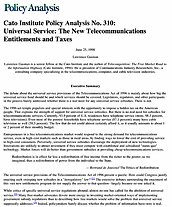The 1996 act tempts populists and special interests with the opportunity to impose a hidden tax on the American people. That explains the strength of support for universal service subsidies. But there is no real need for subsidies for telecommunications services. Currently, 93.9 percent of U.S. residences have telephone service (more, 98.3 percent, have televisions). Even most of the poorest households have telephone service (87.1 percent); many have cable television as well (58.3 percent). The few that do not could almost certainly afford it, as it usually amounts to about 1 or 2 percent of their monthly budget.
Entrepreneurs in a free telecommunications market would respond to the strong demand for telecommunications service, even in high-cost markets such as those in rural areas, by finding ways to lower the cost of providing service to high-cost consumers. Perversely, universal service subsidies discourage the deployment of new technologies. Innovations are unlikely to attract investment if they must compete with established and subsidized “status quo” technology. Market forces will do better than government subsidies at providing cheap telecommunications services.


